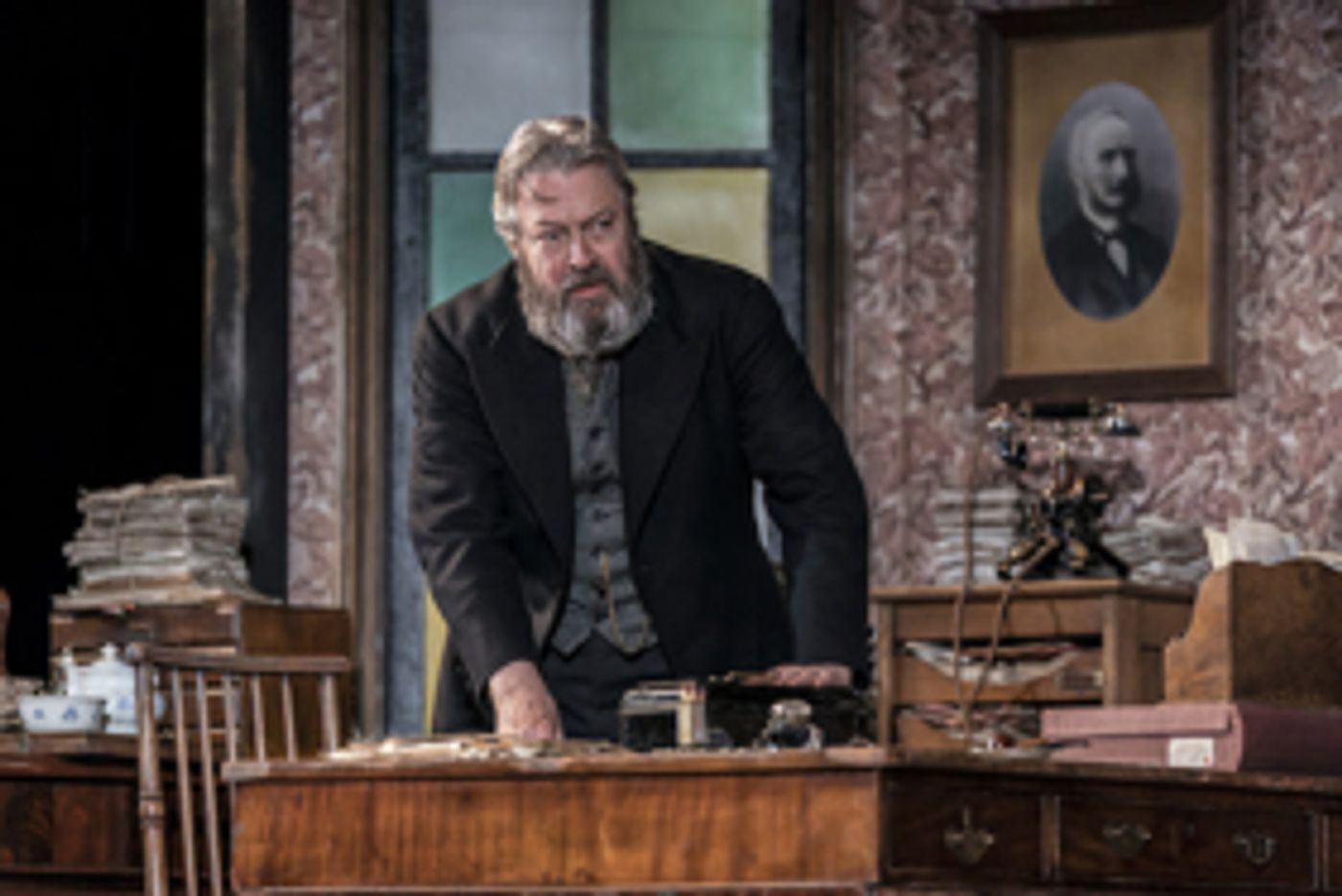Review: RUTHERFORD AND SON, National Theatre

![]() Rain gushes down the front of the Lyttelton stage, a pitiless wall of water trapping and framing the Rutherfords - a clan very much defined by their environment. It's an arresting image to open Polly Findlay's sure revival of Githa Sowerby's 1912 drama, inspired by Sowerby's own family's dealings in Tyneside glass manufacturing.
Rain gushes down the front of the Lyttelton stage, a pitiless wall of water trapping and framing the Rutherfords - a clan very much defined by their environment. It's an arresting image to open Polly Findlay's sure revival of Githa Sowerby's 1912 drama, inspired by Sowerby's own family's dealings in Tyneside glass manufacturing.
Last staged at the National in 1994 by Katie Mitchell, Sowerby's play is still fascinating for its female perspective on Edwardian life - exploring similar territory to Ibsen and Shaw, but with a striking point of view that led the Women's Freedom League newspaper The Vote to call it a "Suffrage play" when it first appeared.
It's certainly effective in its gradual undermining of a capitalist, patriarchal structure. John Rutherford is an all-powerful Victorian paterfamilias, tyrannical in his dealings, certain he is always in the right, and cruel in the systematic undermining of his children. But it takes an underhanded act to shore up his troubled glassmaking factory, and his behaviour threatens the very legacy he claims to protect.
It's a juicy part, and Roger Allam's Rutherford is a compellingly beguiling monster. He makes a commanding theatrical entrance via the handy red curtain, is quick with a sardonic retort, and has the air of a brilliant but beleaguered headmaster; the entire takedown of son Richard, whose conversion to the priesthood he views as a cowardly retreat into irrelevance, is merciless but almost admirably so.
Crucially, Allam digs into Rutherford's hubris: by insisting his children have different class aspirations, he has disastrously isolated them from the community and from his own industry savvy; and his lifelong dedication to the "family" business has decimated the actual family. The play's great tragedy is that Rutherford refuses to countenance he might have acted in error - nor is he capable of changing course.
Justine Mitchell is devastating as daughter Janet, denied a chance at happiness with anyone deemed socially beneath her, and yet essentially treated as an unpaid servant by Rutherford. The blistering confrontation between father and daughter is a magnificent duel - underlying affection making each blow land that bit harder - as Janet makes clear that this "better" life was actually a wasted one.
Sam Troughton (reuniting with Beginning teammates Findlay and Mitchell) makes inventor son John a comic, squawking fop, self-consciously aping the accent, dress and mannerisms he presumably encountered in his brief spell at Harrow. But there's also a desperate vulnerability; weak, needy John craves his father's approval, even as he chafes against his authority.
He's doomed, however, by the education Rutherford thought he wanted for his children, but now resents, framing it as being unable to respect them because they're not working men, as he is. How dare John seek success via a scientific formula, rather than years of hard graft? And how could either son possibly contribute to a world they don't understand?
Sowerby's examination of this tortured class-hopping is one of the play's major strengths, reflecting a wider society in flux. But even in an apparently progressive time, the tenuous position of women is made clear: how few choices they have, how much they are still, frustratingly, dependent on men, and how their lives can be callously wrecked by male ego, pride or frailty.
Lizzie Clachan's set emphasises the prison-like claustrophobia: dark, dominating furnishings, like the desk from which Rutherford presides as master and judge, the dining table where seating is by unwavering hierarchy, and the giant chimneypiece suggestive of industry. You can see Rutherford's aspiration to nobility, and how it suffocates his beholden offspring.
It's also apparent how Mary, John Jr's working-class wife, is continually made to feel like an outsider. Yet it's comparative liberation that makes her a surprising match for Rutherford - the trail skilfully laid by Anjana Vasan in a subtle but nuanced performance.
A climactic visual flourish underlines this satisfying turn, but elsewhere the naturalistic staging can feel slightly punishing, at close to three hours - especially in the quieter first half - and strong accents mask some of the dialogue. But the addition of Kerry Andrew's folk music sung a cappella from a sextet up in the circle is a captivating choice, giving the drama a mythical grandeur.
There's strong support too from Joe Armstrong as Rutherford's right-hand man, faced with an agonising decision, and Sally Rogers as the soused but calculating mother of Rutherford's sacked employee. Her edgy entrance, inching retreat, and then gradual occupation of Rutherford's space is a prime example of Polly Bennett's wonderful movement direction.
A sometimes cumbersome drama, but such details are worth the effort to mine from it in this thoughtful and affecting revival.
Rutherford and Son at the National Theatre until 3 August
Photo credit: Johan Persson
Reader Reviews

Videos

